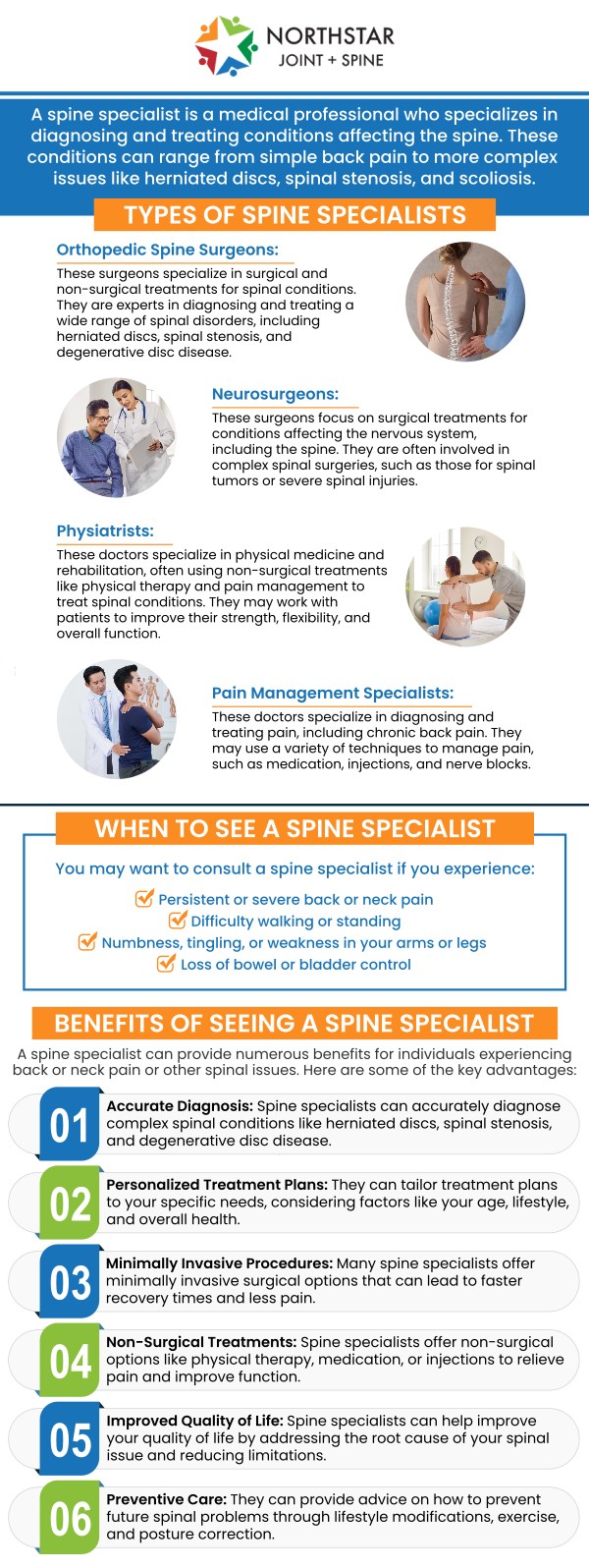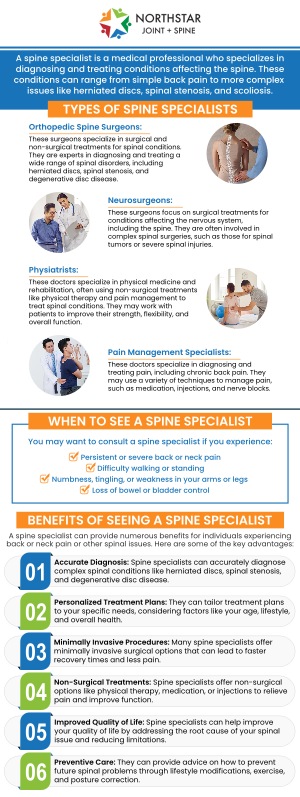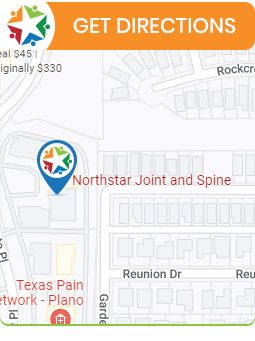Persistent Spinal Pain Syndrome Treatment in Plano, TX
Persistent Spinal Pain Syndrome can significantly impact your daily life, causing ongoing discomfort and limiting mobility. At Northstar Joint and Spine in Plano, TX, we offer comprehensive treatment options to address this condition. Board-certified Dr. Robert J. Nocerini, MD, specializes in providing effective care tailored to your unique needs, helping you achieve long-term relief. For more information contact us today or schedule an appointment online. We are conveniently located at 7704 San Jacinto Pl Suite #200 Plano, TX 75024.


Table of Contents:
How is persistent spinal pain syndrome different from chronic back pain?
What are the common causes of persistent spinal pain syndrome?
What symptoms are associated with persistent spinal pain syndrome?
How long does persistent spinal pain syndrome usually last?
Personalized Persistent Spinal Pain Syndrome Treatment by Dr. Robert Nocerini at Northstar Joint and Spine in Plano, TX
At Northstar Joint and Spine, we understand that chronic back pain can have a profound impact on your daily life, and that not all back pain is the same. Two common but distinct conditions we see in our practice are chronic back pain and Persistent Spinal Pain Syndrome (PSPS).
Chronic back pain refers to discomfort in the back that lasts longer than three months. This pain can result from a variety of causes, such as muscle strain, degenerative disc disease, and arthritis. At Northstar Joint and Spine, our team provides personalized care to identify the source of your chronic back pain, utilizing advanced diagnostics and minimally invasive treatments to restore mobility and improve quality of life.
Persistent Spinal Pain Syndrome (PSPS), on the other hand, is a more specific condition that often brings patients to our clinic after previous spine interventions. Previously known as “failed back surgery syndrome” (FBSS), PSPS describes ongoing or new pain following spinal surgery or procedures. At Northstar Joint and Spine, we recognize that persistent pain can occur even after technically successful interventions, often due to factors like scar tissue or changes in spinal alignment and nerve signaling.
PSPS is classified into two types:
Type 1: Persistent spinal pain in patients who have not undergone spine surgery.
Type 2: Persistent or new pain developing after surgical intervention.
Identifying whether a patient is experiencing chronic back pain or PSPS is crucial for effective treatment. At Northstar Joint and Spine, our team develops tailored care plans. For PSPS, we focus on a holistic approach that may include advanced interventional procedures (such as spinal cord stimulation), medication management, physical therapy, and psychological support.
If you are struggling with ongoing back pain—whether or not you have had prior spine surgery—Northstar Joint and Spine is here to help. Our expertise in treating both chronic back pain and Persistent Spinal Pain Syndrome ensures you receive the most appropriate, comprehensive care for your unique situation.
At Northstar Joint and Spine, we specialize in diagnosing and treating complex spinal conditions, including Persistent Spinal Pain Syndrome (PSPS), formerly known as failed back surgery syndrome. PSPS describes ongoing back or neck pain that continues even after one or more spine surgeries intended to relieve symptoms.
Why Does PSPS Occur?
Our experience at Northstar Joint and Spine shows that PSPS can result from a variety of factors, often working together:
• Scar Tissue Formation (Epidural Fibrosis): Scar tissue can develop around nerve roots after spinal surgery, sometimes leading to nerve irritation and persistent pain.
• Nerve Damage or Compression: Nerve roots may remain compressed, or new compression may develop after surgery. In some cases, nerve damage can occur as a complication.
• Inaccurate Diagnosis: Occasionally, the original pain source was not accurately identified, leading to surgery that doesn’t target the true cause.
• Structural Issues: Problems such as recurrent disc herniation, spinal instability, or degeneration in areas adjacent to the surgical site can all contribute to ongoing pain. Hardware from previous surgeries (such as screws or rods) can also cause irritation if they become loose or misaligned.
Our Approach at Northstar Joint and Spine
PSPS is complex, and at Northstar Joint and Spine, we recognize that every patient’s situation is unique. Our multidisciplinary team uses advanced diagnostic tools to uncover the root causes of persistent pain. We believe in a comprehensive, patient-centered approach that may include:
• Detailed medical evaluations and imaging
• Interventional pain management techniques (such as targeted injections or nerve blocks)
• Physical therapy and rehabilitation programs
• Psychological support and counseling for pain coping strategies
• Coordination with other specialists when necessary
If you or a loved one is experiencing persistent spinal pain after surgery, Northstar Joint and Spine can help you find answers and relief. Contact us to schedule a consultation and start your personalized care plan.
At Northstar Joint and Spine, we recognize the challenges faced by individuals living with Persistent Spinal Pain Syndrome (PSPS)—a condition previously known as “failed back surgery syndrome.” PSPS refers to chronic pain that continues after spinal surgery or emerges as a long-term spinal pain problem, even in those who haven’t had surgery. This complex condition can significantly affect your quality of life, and our expert team is here to help.
Symptoms of PSPS can vary, but often include ongoing or recurring pain in the back, neck, or limbs that lasts for more than three months. Patients may describe the pain as sharp, stabbing, aching, or burning. It may also radiate down the arms or legs—often called sciatica when the lower back is involved. Numbness, tingling, or weakness in the limbs can also occur if nerves are affected. Many people experience stiffness and reduced mobility of the spine, making it difficult to perform daily activities or maintain certain postures. Additional symptoms may include increased sensitivity to touch, muscle spasms, or cramping.
At Northstar Joint and Spine, we specialize in the comprehensive evaluation and advanced management of PSPS and other spinal pain conditions. Our multidisciplinary team uses the latest diagnostic tools and evidence-based therapies—including interventional pain management, physical rehabilitation, and minimally invasive procedures—to help relieve your symptoms and restore your function.
If you or someone you know is experiencing persistent spinal pain after surgery or as part of a longstanding spinal condition, don’t wait. Contact Northstar Joint and Spine today for a personalized consultation and begin your journey toward relief and improved quality of life.
At Northstar Joint and Spine, we understand the challenges faced by individuals living with Persistent Spinal Pain Syndrome (PSPS), formerly known as Failed Back Surgery Syndrome (FBSS). PSPS describes chronic back or leg pain that continues after spinal surgery or develops despite a range of treatments. The duration and severity of PSPS can vary greatly—sometimes lasting months, but often persisting for years, especially when nerve damage or complex underlying conditions are present.
Several factors influence how long PSPS lasts, including the initial spinal condition, previous treatments, overall health, and any complicating factors. At Northstar Joint and Spine, we take a comprehensive approach, offering advanced diagnostic evaluations and a wide range of treatment options tailored to each patient’s unique needs.
Our goal is to improve your quality of life by reducing pain and restoring function. We partner with you to develop a personalized care plan, which may include medication management, physical therapy, interventional pain procedures, and other innovative therapies. If you’re struggling with persistent pain after spine surgery or ongoing spinal pain despite treatment, our experienced team is here to help you find relief and support you every step of the way.
At Northstar Joint and Spine, Board-Certified Dr. Robert Nocerini provides tailored treatment for persistent spinal pain syndrome, helping Plano, TX patients manage ongoing discomfort with advanced, non-surgical techniques. His method focuses on accurately diagnosing pain generators in the spine and applying targeted therapies that improve mobility and overall function. Patients benefit from his hands-on, compassionate approach and evidence-based care.
Dr. Nocerini uses the latest interventional technologies, including nerve modulation and precision-guided injections, to relieve chronic spinal pain. His focus on long-term results ensures patients experience both physical and emotional improvement throughout their recovery journey. By combining deep clinical expertise with personalized care, Dr. Nocerini helps patients regain comfort, stability, and confidence in their daily lives.
For more information contact us today or schedule an appointment online. We are conveniently located at 7704 San Jacinto Pl Suite #200 Plano, TX 75024. We serve patients from Plano TX, Willow Bend TX, Frisco TX, Allen TX, Addison TX, North Dallas TX, and surrounding areas.

Check Out Our 5 Star Reviews


Additional Services You May Need
▸ Back Pain
▸ Shoulder Pain
▸ Chronic Pain
▸ Epidural Steroid Injections
▸ Spinal Cord Stimulation
▸ Viscosupplementation
▸ Genicular Nerve Blocks
▸ Facet Injections
▸ Joint Injections
▸ Sacroiliac Joint Injections
▸ Lumbar and Cervical
▸ Facet Medial Branch Blocks
▸ Diagnostic Nerve Blocks
▸ Medication Management
▸ Neck Pain Doctor
▸ Diabetic Peripheral Neuropathy
▸ Headaches
▸ Suboxone
▸ Peripheral Nerve Stimulation
▸ Spine
▸ Joints
▸ Muscles
▸ Bones

Additional Services You May Need
▸ Back Pain
▸ Shoulder Pain
▸ Chronic Pain
▸ Epidural Steroid Injections
▸ Spinal Cord Stimulation
▸ Viscosupplementation
▸ Genicular Nerve Blocks
▸ Facet Injections
▸ Joint Injections
▸ Sacroiliac Joint Injections
▸ Lumbar and Cervical
▸ Facet Medial Branch Blocks
▸ Diagnostic Nerve Blocks
▸ Medication Management
▸ Neck Pain Doctor
▸ Diabetic Peripheral Neuropathy
▸ Headaches
▸ Suboxone
▸ Peripheral Nerve Stimulation
▸ Spine
▸ Joints
▸ Muscles
▸ Bones






